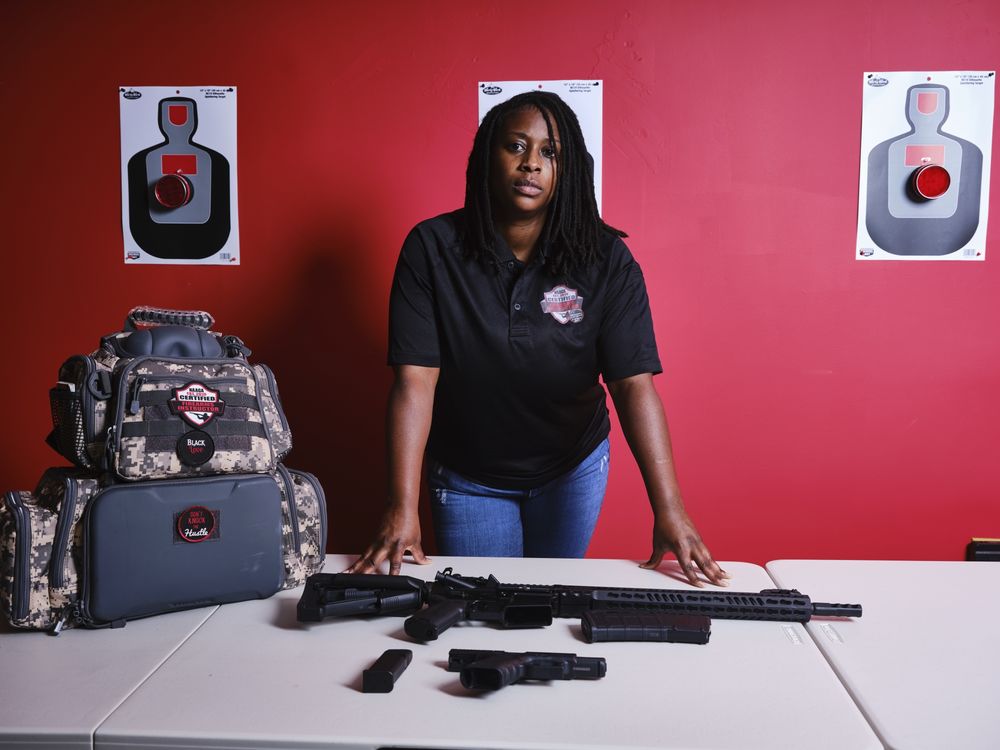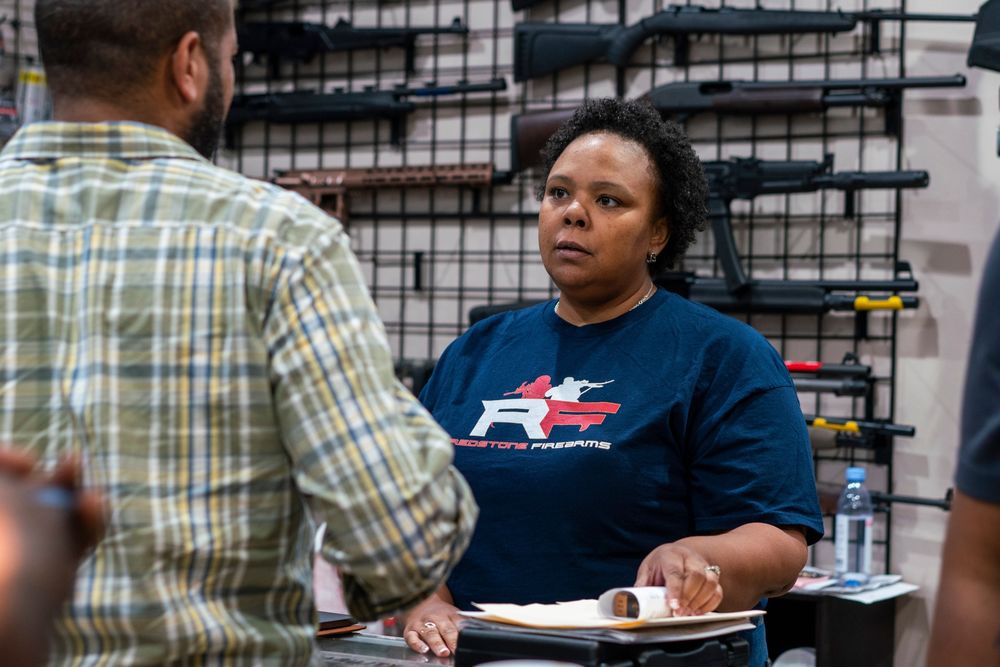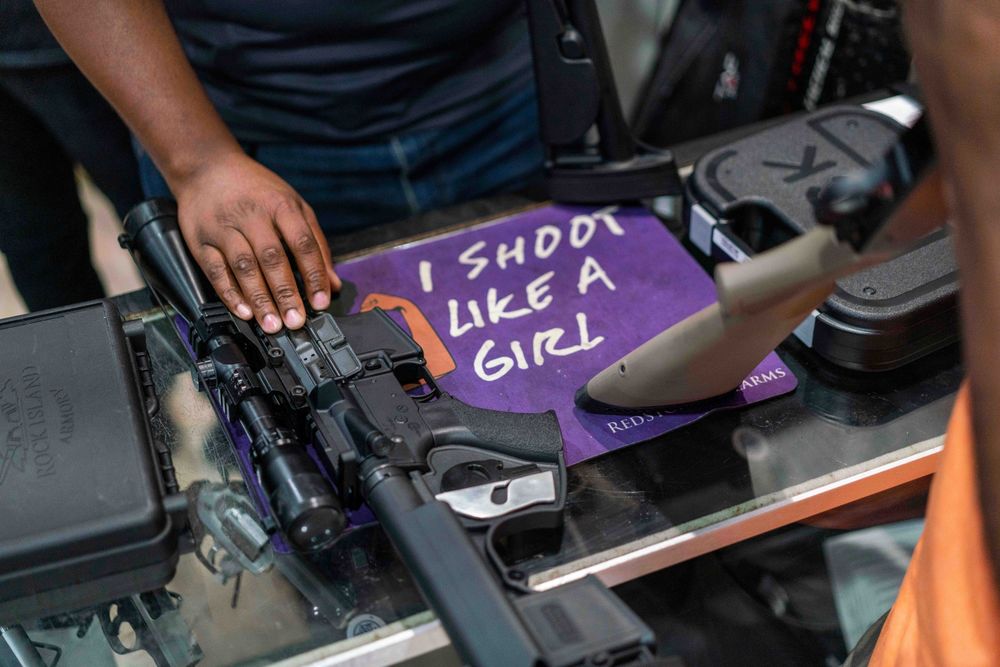Many of the recently armed women say that having a firearm allows them to take safety into their own hands
Karen Romine had her first brush with firearms when her now ex-husband held a gun to her head in an episode of domestic violence. The incident made her terrified of guns, but the pandemic and a new relationship with a military veteran pushed her to consider purchasing one anyway.
So late last year, Romine went to a Tennessee gun dealer and bought a handgun for safety, joining a growing number of Black women making the decision and shattering stereotypes of the typical gun owner.
“I could’ve so easily not been here talking to you because of that,” Romine, a 53-year-old mother of three in Chattanooga, said of the incident. “You don’t have to be on the gun-toting Annie end of the spectrum, but it’s important to have some knowledge and to be able to defend yourself and take care of yourself if you have to.”
While White men still represent the largest group of gun owners in the US, women, and specifically Black women, represent a growing share of the market. The uncertainty brought on by the pandemic along with the social upheaval that came with the police killings of Breonna Taylor and George Floyd in 2020, helped spur many of the firearms purchases. Women who experience intimate partner violence are also among those showing interest in gun ownership, said Akeithea Bost, an Atlanta-area firearms instructor who works with the National African American Gun Association.

Photographer: Matt Odom/Bloomberg
“There was a lot of friction in this country and people feeling unsafe,” Bost said. “We have a lot of members in NAAGA who are consistently training now.”
NAAGA, which was founded in 2015, has about 48,000 members and 120 chapters across the US, according to a spokesperson. That’s up from 30,000 members and 75 chapters in 2019.
Many of the newly armed women say that having a firearm allows them to take their safety into their own hands. Black women experience domestic violence and other violent crimes at disproportionately higher rates than White women. The murder rate for Black women is more than double the rate for White women in the US, according to a report from the Violence Policy Center. Black people are twice as likely to be killed by police and homicides involving Black victims are less likely to be solved.
That bleak picture has likely played a role in a surge in firearms purchases. It’s difficult to get a full picture of gun sales in the US because the transactions are not tracked by the government. Instead, survey data and federal law enforcement background checks serve as a proxy.
An estimated 3 million more people purchased firearms in 2020 than did in 2019, and nearly 1.5 million more people became new gun owners over that period, according to the National Firearms Survey. Nearly half of the new gun owners were women and a fifth of those were Black, according to the survey. A separate survey by the National Shooting Sports Foundation, an industry trade group, found that 87% of sellers reported an increase in Black women purchasers in the first half of 2021.

Photographer: Kyle Grillot/Bloomberg
Geneva Solomon, co-owner of a Southern California gun shop with her husband, said she’s seen a rapid rise in Black women coming in to buy firearms and for training. Courses that used to draw three or four people a day have ballooned to 30 for online training, many of whom are women, she said.
“When the pandemic hit there were a lot more women coming into the class. I had to revamp the program to instruct the other teachers on how to deal with women,” Solomon said. “I saw a lot of Black women — women who were single mothers, professors, women from all walks of life.”
Solomon didn’t grow up around firearms. In fact, she was taught to stay away from guns. Her father, who lost his leg after being shot, worked to keep guns away from their home. She was the victim of domestic violence and decided to buy a gun after her divorce more than a decade ago to protect herself and her children, she said.
Romine used to be “totally opposed” and terrified of buying a gun or having one in her home. “The whole nine,” she said. And while she acknowledged it’s not for everyone, she’s found a community of like-minded Black women in the Tennessee area who have a mix of experience with firearms. The Sistas of Steel gun group, which has gained 37 members since forming this year, gathers to do gun safety classes, socialize and shoot at the range.
But the trend is concerning to public health and law enforcement officials. There are 393 million guns in the US and the Centers for Disease Control and Prevention considers gun violence a “serious public health threat.” US gun deaths rose 35% in 2020 — exceeding the worst levels recorded in the 1990s — with the biggest increase in firearm homicides among Black people, according to CDC data.

Photographer: Kyle Grillot/Bloomberg
The increase in gun ownership has also coincided with an increase in gun violence, and turned into a political issue as mayors and other officials struggle to find solutions. The issue was brought to the fore recently when the home of Los Angeles mayoral candidate Representative Karen Bass was broken into.
The intruders left cash, electronics and other valuables, but took two firearms from Bass’s home. It was counterintuitive to some that the long-time Democratic congresswoman would own firearms. But Bass has been a gun owner for decades, first learning to handle firearms as a community organizer in the 1970s. She told the LA Times that a Los Angeles Police Department officer taught her.
Bass, who declined an interview request for this story, publicly called the burglary “unnerving” and said, “unfortunately, it’s something that far too many Angelenos have faced.” She has repeatedly defended her handling of the guns, saying they were ‘’safely and securely’’ stored. Two men have been arrested in the case.
For Romine, buying a gun has given her a new set of friends and she enjoys going to the firing range. Learning how to handle a weapon has given her reassurance that she’ll be prepared should the need arise.
“I think it’s a piece of my personal safety — I don’t want to make it the end all, be all of my personal safety,” she said. “I don’t think Black women have really looked at or taken into thought that owning a gun or going to gun classes was something we could do. Joining this group, there’s a sense of empowerment that comes with it.”

